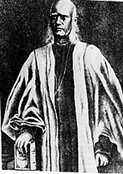Banerji, Rev. Krishna Mohan
Banerji, Rev. Krishna Mohan (1813-1885) social reformer, scholar, linguist and Christian missionary, was born on 24 May 1813 in Kolkata. Although his father was too poor to afford a good education for him, Krishna Mohan was fortunate to receive the affection and backing of david hare, the renowned intellectual and philanthropist of the time. With his generous help, he had had his schooling at Pataldabga School, which gave him, in 1824, a scholarship to pursue his education at hindu college, where he finished his studies at the end of 1829.
henry derozio, a sixteen year old young man of Portuguese origin, joined Hindu College in 1826 and soon attracted his students by his teaching ability. He inspired his students to look at critically every aspect of life, including religious beliefs and social customs. Although not his direct student, Krishna Mohan was greatly influenced by Derozio’s teachings. Influenced by his teachings, he and his friends started to raise questions about the traditional Hindu customs and usages, and orthodox lifestyle. This Anglicised group came to be known as Young Bengal and Krishna Mohan became one of its leader.

Even though, no one of this group had formally renounced Hinduism yet, they were condemned by the conservative elements as anti-social iconoclasts and even Christians; and for their conduct, their teacher was held responsible. Derozio was compelled to resign his post in April 1831; and Krishna Mohan, partly in protest of this injustice, launched within a month his first English journal, Enquirer, through which he vindicated the position of Young Bengal and criticised the conservatives as well as hinduism. Later, he edited a few more journals, both in English and Bangla.
From the extracts published in Enquirer, it becomes evident that he and his friends had a good grounding in English and more significantly; they got united to resist the pressure of conservative society. They were openly defying Hindu customs and even declared that if they hated anything from the bottom of their hearts, it was Hinduism.
In October 1832, Krishnamohan was converted by alexander duff to christianity, which led to his dismissal from Pataldanga School. Undaunted, he started preaching Christianity and converted many including Brajanath Ghosh; his wife, Bindubasini Devi; his brother, Kali Mohan Banerji; and Jvanendra Mohan Tagore, who later became the first barrister in Bengal. He also played a part in converting michael madhusudan dutt to Christianity.
Krishna Mohan studied Christianity for sometime in Bishop's College and became a clergyman in 1839. After retiring in 1852, he joined Bishop's College as a professor and worked there until 1868. He was a progressive social reformer and defended government's prohibition of sati. He wrote a number of pamphlets on the need of female education. He was one of the leading members of the indian association. He was also associated with bethune society (1851), Bangiya Samaj-Bijvan Sabha (1866), Bharat-Samskar Sabha (1870) and asiatic society.'
Krishna Mohan was a competent linguist and scholar. He learnt among other languages Greek and Hebrew, and published a number of books in Bangla, Sanskrit and English. He wrote on religion, philosophy, society, social issues and even on science. His most important contribution was his thirteen-volume encyclopaedia, vidyakalpadruma (1846-51), first of its kind in Bangla. His other works include Upadexhkatha (1840), Saradarxhan Sangvad (1867), Rig-Veda-Samhita (1875), Raghuvangxha (1874); The Kumar Sambhaba of Kalidasa (1867), Dialogues on the Hindu Philosophy (1861), and The Arian Witness (1875).
Krishna Mohan was a Fellow (1867-68) of university of CALCUTta, which also honoured him with the degree of Doctor of Law in 1876. Soon after, the Government of India awarded him the title of CIE. He was also made a member of the Royal Asiatic Society. Krishna Mohan died on 11 May 1885. [Ghulam Murshid]
